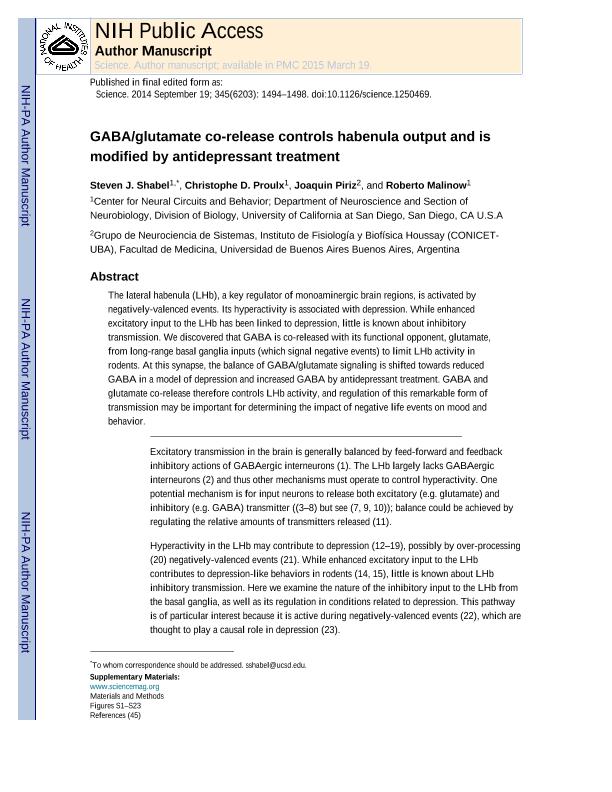Mostrar el registro sencillo del ítem
dc.contributor.author
Shabel, Steven J.

dc.contributor.author
Proulx, Christophe D.

dc.contributor.author
Piriz, Joaquin

dc.contributor.author
Malinow, Roberto

dc.date.available
2017-05-08T22:09:01Z
dc.date.issued
2014-09
dc.identifier.citation
Shabel, Steven J.; Proulx, Christophe D.; Piriz, Joaquin; Malinow, Roberto; GABA/glutamate co-release controls habenula output and is modified by antidepressant treatment; American Association for the Advancement of Science; Science; 345; 6203; 9-2014; 1494-1498
dc.identifier.issn
0036-8075
dc.identifier.uri
http://hdl.handle.net/11336/16125
dc.description.abstract
The lateral habenula (LHb), a key regulator of monoaminergic brain regions, is activated by negatively valenced events. Its hyperactivity is associated with depression. Although enhanced excitatory input to the LHb has been linked to depression, little is known about inhibitory transmission. We discovered that γ-aminobutyric acid (GABA) is co-released with its functional opponent, glutamate, from long-range basal ganglia inputs (which signal negative events) to limit LHb activity in rodents. At this synapse, the balance of GABA/glutamate signaling is shifted toward reduced GABA in a model of depression and increased GABA by antidepressant treatment. GABA and glutamate co-release therefore controls LHb activity, and regulation of this form of transmission may be important for determining the effect of negative life events on mood and behavior.
dc.format
application/pdf
dc.language.iso
eng
dc.publisher
American Association for the Advancement of Science

dc.rights
info:eu-repo/semantics/openAccess
dc.rights.uri
https://creativecommons.org/licenses/by-nc-sa/2.5/ar/
dc.subject
Lateral Habenula
dc.subject
Depression
dc.subject
Co-Release
dc.subject.classification
Neurociencias

dc.subject.classification
Medicina Básica

dc.subject.classification
CIENCIAS MÉDICAS Y DE LA SALUD

dc.title
GABA/glutamate co-release controls habenula output and is modified by antidepressant treatment
dc.type
info:eu-repo/semantics/article
dc.type
info:ar-repo/semantics/artículo
dc.type
info:eu-repo/semantics/publishedVersion
dc.date.updated
2017-04-26T14:13:56Z
dc.journal.volume
345
dc.journal.number
6203
dc.journal.pagination
1494-1498
dc.journal.pais
Estados Unidos

dc.journal.ciudad
Washington D. C.
dc.description.fil
Fil: Shabel, Steven J.. University of California at San Diego; Estados Unidos
dc.description.fil
Fil: Proulx, Christophe D.. University of California at San Diego; Estados Unidos
dc.description.fil
Fil: Piriz, Joaquin. Consejo Nacional de Investigaciones Científicas y Técnicas. Oficina de Coordinación Administrativa Houssay. Instituto de Fisiología y Biofísica Bernardo Houssay. Universidad de Buenos Aires. Facultad de Medicina. Instituto de Fisiología y Biofísica Bernardo Houssay; Argentina
dc.description.fil
Fil: Malinow, Roberto. University of California at San Diego; Estados Unidos
dc.journal.title
Science

dc.relation.alternativeid
info:eu-repo/semantics/altIdentifier/doi/http://dx.doi.org/10.1126/science.1250469
dc.relation.alternativeid
info:eu-repo/semantics/altIdentifier/url/http://science.sciencemag.org/content/345/6203/1494
dc.relation.alternativeid
info:eu-repo/semantics/altIdentifier/url/https://www.ncbi.nlm.nih.gov/pmc/articles/PMC4305433/
Archivos asociados
